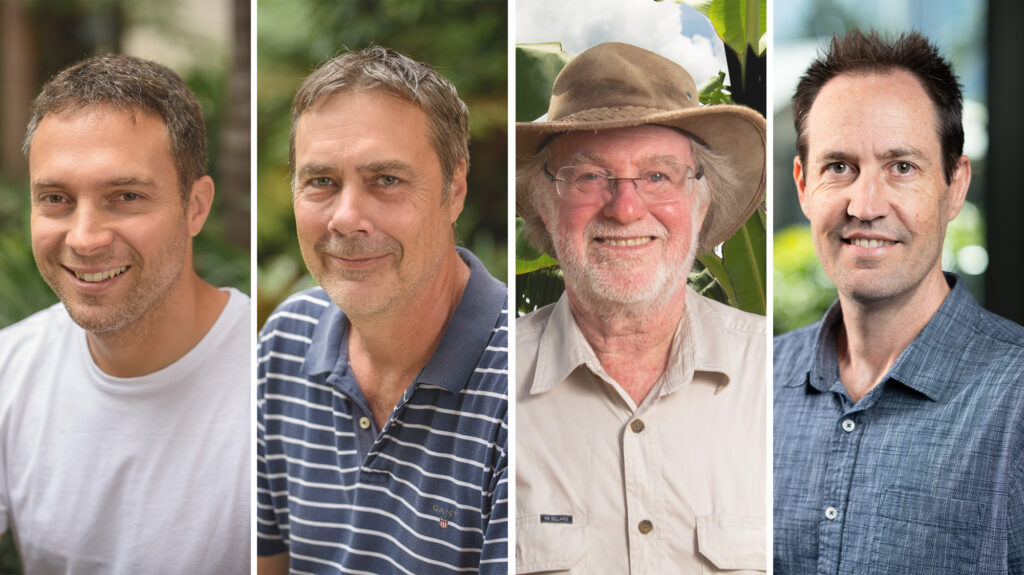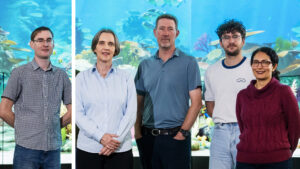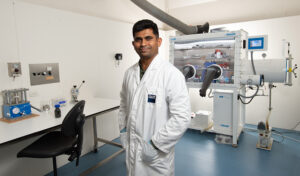
A number of CAB researchers have received grants from the Australian Economic Accelerator Ignite program:
Securing the future of the iconic Australian banana industry
Dr Anthony James, from QUT’s Centre for Agriculture and the Bioeconomy and School of Biology and Environmental Science, will lead this project with a $499,989 grant.
The project’s research team (pictured, above) also comprises Dr Jean-Yves Paul, Adjunct Professor Rob Harding, Distinguished Professor James Dale with partner Australian Banana Growers’ Council.
Dr James (pictured, top right) said the researchers aimed to future-proof the $1.3 billion Australian banana industry by investigating if QCAV-4, a genetically modified Cavendish Grand Nain banana resistant to Panama disease tropical race 4, is also resistant to other fungal diseases affecting banana production in Australia.
The team will also develop Cavendish Williams bananas, Australia’s preferred cultivar, with the same disease resistance as QCAV-4.
“The industry faces significant challenges from diseases, with control measures driving up production costs and threatening long-term viability” Dr James said.
“Disease-resistant banana varieties are essential to safeguarding the industry. This project will evaluate our novel technology to develop a world-first, multi-disease resistant Cavendish – aiming to reduce production costs, cut reliance on fungicides, and sustain banana productivity despite serious disease threats.”
Bioadhesives for underwater applications
 CAB researchers Dr Lalehvash Moghaddam (far right) and Mr Adrian Baker (far left) are members of this project, led by Professor Leonie Barner (second from left), which aims to optimise the QUT-developed underwater bioadhesives for different methods of coral reef restoration as well as for use in marine industries.
CAB researchers Dr Lalehvash Moghaddam (far right) and Mr Adrian Baker (far left) are members of this project, led by Professor Leonie Barner (second from left), which aims to optimise the QUT-developed underwater bioadhesives for different methods of coral reef restoration as well as for use in marine industries.
Professor Barner said the team began developing underwater bioadhesives, using biobased and biodegradable raw materials to make their bioadhesive ecofriendly and economical to produce.
“The challenges for active restoration of the Great Barrier Reef and other large marine ecosystems include restoring at scale, economic viability, and sustainable restoration strategies while minimising the carbon footprint of manufacture and introduction and of permanent foreign materials in such pristine marine environments,” Professor Barner said.
“The Great Barrier Reef is an economic, social, and iconic asset valued at $56 billion that generates $6.4 billion annually to the Australian economy.
“Underwater adhesives are a novel technology and have important applications in marine ecosystem protection and repair and more broadly for the global ocean economy as an increasing amount of technology is deployed underwater.
“These technologies will need repair or modification and underwater adhesives have the potential to meet this need in place while avoiding the cost of bringing them to the surface.”
Advanced Manufacturing of Hard Carbon from Agricultural Waste for Sodium-Ion Batteries
Professor Deepak Dubal (pictured, left) has received $347,966 for the project, which aims to scale up a rapid heating process to produce high-quality hard carbon anode materials for sodium-ion batteries using for agricultural waste feedstock.
(pictured, left) has received $347,966 for the project, which aims to scale up a rapid heating process to produce high-quality hard carbon anode materials for sodium-ion batteries using for agricultural waste feedstock.
“This project seeks to enhance the production of materials for sodium-ion batteries, which are a promising alternative to commonly used lithium-ion batteries,” Professor Dubal said.
“Traditional battery production methods rely on non-renewable feedstocks and high temperatures, energy intensive processes leading to high costs, low carbon yield, and significant carbon footprints in manufacturing sectors.
“Our objective is to develop and test new battery cells made from these carbon materials to see if they match or exceed the performance of current commercial batteries.
“By improving our process and implementing a continuous production system, we will increase the efficiency and practicality of this technology.
“Ultimately, this project will contribute to introducing a sustainable method for producing battery materials that offer more environmentally friendly batteries for various uses.”
The project aligns with Australia’s National Reconstruction Fund priorities, Net Zero 2050 commitments and Future Made in Australia goals.
The project’s industry partner is Xcel Sodium.
High Energy, Safe and Recyclable Single Electrode Supercapacitors
Professor Deepak Dubal will also work with Dr Mahesh Chougale who have received $354,162 for this project.
Professor Dubal said the project focused on developing a new type of energy storage device known as a single-electrode supercapacitor with high energy density and long-term cycling stability.
“Supercapacitors are commonly used in various electronic devices and vehicles to store and quickly release energy, but existing technologies face limitations, such as lower energy density.
“Optimising key components in traditional supercapacitors. This groundbreaking cell design reduces the risk of common issues such as short circuits and thermal runaway, thereby improving the safety of energy storage,” Professor Dubal said.
Dr Chougale said optimisation would also decrease the chance of material degradation and failure over time, enhancing the overall safety and reliability of the cell.
“Such reliability is crucial in critical applications, including aerospace, medical devices, and the automotive industry, where long-term performance and safety are essential,” he said.
This project aligns with Australia’s National Reconstruction Fund priorities, Net Zero 2050 commitments and Future Made in Australia goals,
The industry partner is Out The Back Ventures.
Article originally published in QUT news.